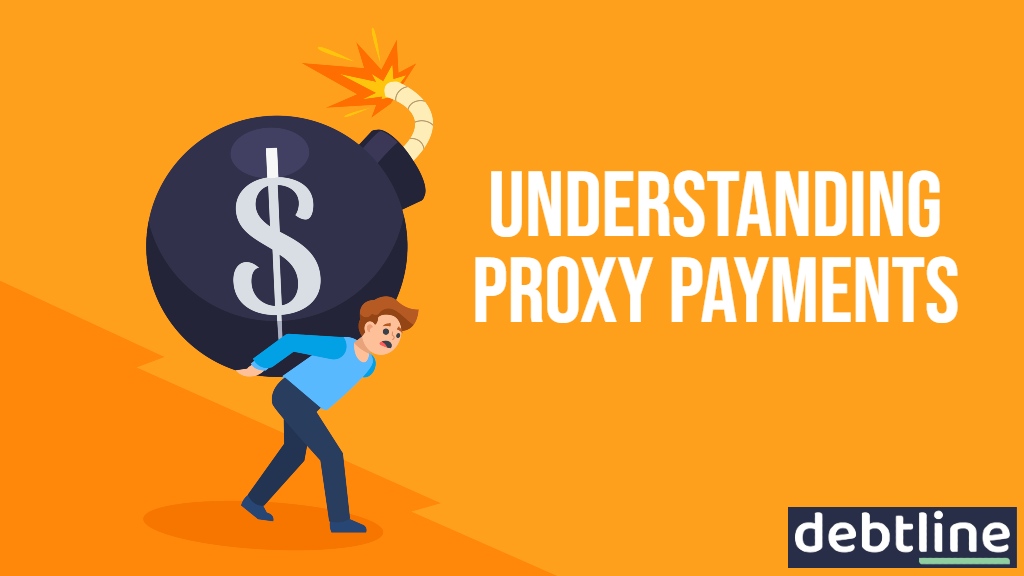Understanding the Danger of Proxy Payments

In today’s digital age, convenience often comes at a cost, especially when managing finances. Proxy payments, while convenient, can pose significant risks to South African individuals’ financial health.
In this article, we’ll delve into what proxy payments are and why you should avoid them to prevent debt. Additionally, we’ll explore other ways you could unwittingly find yourself responsible for indirect debt, including joint accounts, co-signing for a loan, and marriage contracts.
What Are Proxy Payments?
Proxy payments refer to allowing a third party to make payments on behalf of an account holder. These payments often occur when individuals authorise family members, friends, or even companies to make payments from their bank accounts or credit cards.
Read: How Debt Can Impact Your Loved Ones
Understanding the risks of proxy payments is vital to your financial well-being. While proxy payments may seem convenient, they can lead to financial pitfalls and debt accumulation if not managed carefully.
Why You Should Avoid Proxy Payments
Proxy payments may offer short-term convenience but often have long-term financial consequences. Therefore, individuals must control their finances and avoid outsourcing payment responsibilities to third parties.
Avoiding proxy payments is crucial for maintaining financial stability and avoiding debt. By proactively managing finances responsibly and staying out of debt traps, individuals can safeguard their financial well-being and avoid debt.
Understanding the Liability
Co-signing a loan for a spouse, a family member, or a friend can be a very generous gesture, but one needs to understand that it does come with significant risk. You’re essentially guaranteeing the loan and agreeing to repay it if that primary borrower defaults.
Read: Love & Money: Talking To Your Partner About Debt
Besides surety agreements, you could unwittingly find yourself liable for debt you haven’t directly incurred. If you hold a joint account, you may co-sign for a loan or need help understanding the implications of your marriage contract.
Marriage and Proxy Payments
Being married, especially with the different types of marriage contracts available in South Africa, presents a unique blind spot you might not know. Here’s what you should know before you get married:
- Married In Community of Property: All assets and liabilities are combined to form a single joint estate. All debts incurred before and during marriage will form part of the joint estate. The actions of each spouse can affect the other. So, for example, if one is declared insolvent, both spouses will automatically be sequestrated.
- Married Out of Community of Property: Your estates will remain separate. Any debt accumulated before or during the marriage will remain the responsibility of the spouse who incurred it.
- Married Out of Community of Property With Accrual: Debts you incur before you marry will not count towards the accrual calculation. Consequent debts will be considered on the dissolution of the marriage, either through divorce or death.
However, debts reduce the value of the assets if your marriage leads to resolution. Even though the accrual protects you from creditors, excessive debts could affect your share.
Read: Finding Financial Empowerment in Marriage
How To Navigate The Problem
Let’s say you already find yourself in a situation where you have co-signed for something or are responsible for someone else’s debt; Sarah Nicholson offers valuable tips and proactive steps to navigate the problem.
- Assess the situation: You need to know the total amount and to whom the money is owed. Ask questions and be understanding of the payment terms (the interest rate and deadlines)
- Communicate with the creditors: It’s essential to have a conversation with them and allow open communication. Running away or avoiding phone calls won’t solve the problem; it only adds to it.
- Seek advice from debt counsellors or financial advisors: It remains your responsibility to prioritise your financial well-being. By seeking advice, you take steps to protect yourself from a similar situation in the future.
- Set boundaries: If a friend, family member, or partner caused the financial problem, setting clear boundaries regarding financial matters is crucial for your own financial protection.
- Monitor your credit score: Protecting your credit score is vital, as it can affect your ability to get credit later, even if you did not incur the debt. Monitoring your credit report and ensuring the repayments are made will ensure they do not negatively impact your financial future.
Joint liability situations can be advantageous when co-signing for a home loan, for example. In this case, you must understand the risks, especially if one of you cannot make their share or part of the payment. Approach your debt responsibly, and don’t just sign for someone else’s debt without first understanding what you are getting into.
Maintain Control Over Your Finances
Proxy payments may seem convenient initially but can lead to financial pitfalls and debt accumulation if not managed carefully.
If you’re facing financial challenges or struggling with debt, contact Debtline. We offer comprehensive solutions to help you resume control of your finances and achieve financial freedom.
Our team of experts will work closely with you to address your concerns and provide practical solutions for debt relief. Your financial well-being and debt-free future are our priorities!